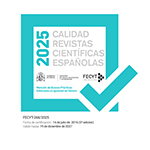The construction of a people’s power to use. Elections in Poland and the GDR (1947-1958)
Abstract
Studies on electoral processes in the former socialist states are still scarce. There is a certain consensus on the functions of these elections, which were far from being a method of democratic election of public representatives, but played a more relevant role than that of mere fiction, since they served to legitimize the socialist regimes and structured the mobilization of the population around economic and social objectives. But there are not many detailed studies on the evolution of these systems, the concreteness of their mechanisms and the temporal development of these functions assumed by historiography. Using documentary, legislative, newspaper and bibliographical sources, the birth of the electoral systems in the People’s Republic of Poland and the German Democratic Republic and the changes they underwent in their first years, in a foundational context of the new regimes, in a framework of stability and in a situation of crisis, are compared. The conclusions analyse the similarities of the electoral systems under the different circumstances, which were a basic differentiating factor in the chronology and the different degree to which the Sovietization of Eastern Europe was found.
Downloads
Article download
License
Aquellos autores/as que tengan publicaciones con esta revista, aceptan los términos siguientes:
a. Los autores/as conservarán sus derechos de autor y garantizarán a la revista el derecho de primera publicación de su obra, el cuál estará simultáneamente sujeto a la Licencia de reconocimiento de Creative Commons Reconocimiento-No comercial-Sin obra derivada 4.0 España que permite a terceros compartir la obra siempre que se indique su autor y su primera publicación esta revista.
b. Los autores/as podrán adoptar otros acuerdos de licencia no exclusiva de distribución de la versión de la obra publicada (p. ej.: depositarla en un archivo telemático institucional o publicarla en un volumen monográfico) siempre que se indique la publicación inicial en esta revista.
Plagio y fraude científico
La publicación de un trabajo que atente contra los derechos de propiedad intelectual será responsabilidad de los autores/as, que serán los que asuman los conflictos que pudieran tener lugar por razones de derechos de autor. Los conflictos más importantes pueden darse por la comisión de plagios y fraudes científicos.
Se entiende por plagio:
1.Presentar el trabajo ajeno como propio.
2.Adoptar palabras o ideas de otros autores sin el debido reconocimiento.
3.No emplear las comillas u otro formato distintivo en una cita literal.
4.Dar información incorrecta sobre la verdadera fuente de una cita.
5.El parafraseo de una fuente sin mencionar la fuente.
6.El parafraseo abusivo, incluso si se menciona la fuente.
Las prácticas constitutivas de fraude científico son las siguientes:
1.Fabricación, falsificación u omisión de datos y plagio.
2.Publicación duplicada.
3.Conflictos de autoría.












